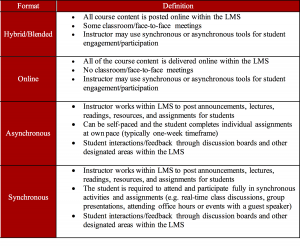More and more, colleges and universities are moving away from traditional, classroom-based learning models to more convenient and affordable online offerings. According to a recent study, distance—or online—learning in the United States has seen a steady increase over the last 5 years, while on-campus class attendance has decreased by 6.4 percent. And given the advantages of online learning, for both students and colleges and universities, the trend is likely to continue.

What does that mean for students? In this post we will look at what online learning is, how it works and the benefits it offers learners and, in particular, part-time, working adults. Next week, we will look at whether or not online learning is right for you.
What is Online Learning?
Let’s face it; there is no formal definition of online learning. The evolving landscape of online learning is a contemporary form of e-learning where students engage with course content via the internet. Online learning offers meaningful learning experiences using a wide variety of teaching formats including fully online, in which all activities are online, hybrid/blended, combining online and classroom learning, asynchronous or self-paced learning, and synchronous, or real-time group learning (see chart).

Course content and learning activities are provided online through a Learning Management System (LMS) which is easily accessed by both instructors and students. Because online and hybrid courses are available via the internet, they are accessible 24 hours a day, seven days a week and provide opportunities for innovative and practical experiences where students can apply their knowledge and skills.
What are the benefits of online learning?
Whether students are engaged in group or self-paced activities, online or a combination of online and classroom instruction, new and often innovative learning experiences take place. Online learning allows students various ways to communicate and process information from a variety of sources including the internet, web resources, and the learning community created within the LMS.
There are numerous benefits to learning in an online environment:
-
- Convenience: Students have the opportunity to learn from anywhere and at any time. Online course materials are easily accessed and can be downloaded from the LMS allowing students to create a schedule and select a location that fits their needs.
-
- Confidence Participating in online courses can be less intimidating for some students than in a face-to-face environment. Students who may be shy are much more likely to participate in an online course environment. This produces a greater diversity of opinion and shared perspectives as well as creates an engaging student learning experience.
-
- Credits: Today, many colleges and universities are accepting transfer credits for online courses. Depending on the program, students may be eligible to transfer in college credit and complete their online degree faster.
-
- Cost Effective: Online learning is less expensive than traditional classroom-based courses. Students who work either full time or go to school part time would not have to take time off or waste time commuting to campus. This allows students to be committed to their learning without having to worry about missing a class.
-
- Communication: Online learning makes is easier for students to reach out to their instructors with questions, support and feedback. Students can connect with their instructors in a variety of ways such as through online discussion forums, email, or by scheduling a web meeting or phone call.
-
- Career focused: Employers are seeking more online learning opportunities to help employees develop new skills, provide new career paths for professional growth and advancement. Students would have the opportunity to take online courses that allows them to be remain competitive and improve their job performance.
Simply put, online learning is a win-win for everyone. For colleges and universities, it presents the opportunity to offer new and innovative learning experiences to more and more students. For students, and in particular, part-time students trying to balance work and family, it opens the door to the education and training they need to reach their personal and professional goals. And for employers, it provides a steady stream of well-trained and educated employees to fill much needed positions.
With all of that going for it, online learning is sure to continue to grow and will likely be the wave of the future in higher education.
Next week, we will discuss ways to determine if an online learning environment is the right choice for you.
About the Author
Ke’Anna Skipwith is the Director of Online Learning in the College of Professional and Continuing Education at Wentworth Institute of Technology. She holds a MS in Learning Technologies from Drexel University and is pursuing her Ed.D at Northeastern University in Higher Education Administration. She is a member of EDUCAUSE and the University Professional and Continuing Education Association (UPCEA). Ke’Anna is also the co-author of the book: Best Practices in Engaging Online Learners Through Active and Experiential Learning Strategies (2017).




